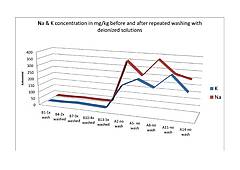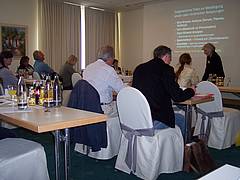News
Newsletter July 2011
What we would like you to know:
LABORATORY INFORMATION
- We proudly announce that Dr. Armin Schönberger, has joined us. Dr. Schönberger is a recognized laboratory physician known for his expertise in microbiological testing.
- At this point in time, we provide microbiological testing of fecal samples, but we advise you that shipping (and temperature fluctuations during transit) greatly affect bacterial and fungal growth. This makes it difficult to provide repeatable results. Unless we receive a sample within 24hrs, we will not accept stool samples for microbiological testing. Analytical creditability is important to us.
- We do not test for sodium and potassium in Hair. In fact, we stopped testing sodium and potassium in hair samples over 10 years ago, when our internal research supported the traditional medical consent that hair sodium and hair potassium testing is not reliable. To disprove or prove that point, we devised the following experiment.
- We mixed chemically untreated hair samples of many different patients. We homogenized this large bulk of hair, meaning we cut the entire batch of hair into small samples about 1cm in length. We thoroughly mixed this bulk of hair.
- We took two of the homogenized sample and tested them without washing (B2) and we used another 2 samples (A2), washed and tested them. For the washing and testing process, we used metal-free solutions. (B=before; A=after)
- To avoid instrument fluctuations, we repeated this experiment with hair from the same batch some days later (B4& A5), and again repeated the experiment on follow up days with B7&B8, and B10&B11 and B13&A14.
- This data clearly indicates that meticulous washing is a must. Table 1 also shows that meticulously washed samples easily remove sodium and potassium. Since these minerals are found in sweat, shampoos, conditioners, gels, hair sprays and other hair cosmetics, it is a logical conclusion to state that unwashed hair cannot provide sodium and potassium levels that are diagnostically significant.
Find out if the laboratory you use, or have used, is washing hair sample before testing. Proper washing affects all metals found externally on hair. If you should attempt to compare results from two different laboratories, keep in mind that test results from washed versus unwashed samples cannot be compared.
SAMPLE SUBMISSION & REPORT DELIVERY
- Nearly all the international doctors that work with us receive reports via e-mail. If you are interested in this option, send your request to service@microtrace.de or make a note on the sample submission sheet when sending your next sample.
- Often, patients ask us to submit a report copy to their personal address. We honour this request, provided the e-mail address is written legibly. We like to point out, however, that it is not uncommon for patients to contact us after they have received their results, asking us for a report interpretation. We believe the patient should consult you, the treating physician. If you have a question regarding the results, we’ll be happy to assist you.
- When you submit samples, please provide the patient’s sex and date of birth. We need this information to complete reports, because our reference ranges are age- and sex dependent. Without this information, report delivery is delayed.
- Ocassionally, we see extreme results. If the sample submission sheet provided us with clinical information, we can alert and assist you, either by e-mail, fax or phone.
- Please write on urine tubes the patient name and list if the sample is a baseline or a provocation urine. It helps quality control.
- Details regarding the Chelating Agent, what form (IV or oral), and how much administered, greatly helps our data validation and evaluation process. Each Chelator has a specific metal-binding ability, which we can take into account when validating data. Without this information, we are unable to provide reports with chelator-specific reference ranges.
- To perform genetic testing, we need to have a signed Patient Consent Form. We can e-mail or fax a copy.
BILLING INFORMATION
- Patients living outside Germany must provide payment information. The easiest payment form is Visa or Mastercard. To charge a card, we need the cardholder’s name, card number, expiration date and security code. Patients afraid to add the complete information on the sample submission form, can fax us the remaining information or send it via e-mail. If they speak English, German or French, they may also call us.
- The invoices we provide to German patients show insurance-required details that are most likely not accepted or needed in your country. If the insurance requirements in your country require special attention, let us know. If we can help, we will.
RESEARCH
- At present, we are completing Part 1 of our study on Autism. We hope to have it published soon. In cooperation with Assistant Professor Dr. Omnia Raffat of Kairo University we tested 25 children diagnosed with Autistic Spectrum Disorder and compared them to a group of 25 healthy children, all of which lived in the same area and under similar condition. We identified four statistically significant differences:
- The mothers of the autistic group were noticeably older than the mothers of the test group.
- Mothers of the autistic group consumed considerably more seafood during pregnancy, and the autistic children also ate significantly more sea food during the infancy period than the healthy test group children.
- Both, mothers and children of the autistic test group were much more exposed to second hand smoke exposure during pregnancy and early childhood.
- Hair and urine of the autistic group showed statistically significant higher concentration of lead, mercury, arsenic and
NEWS
- Check our newly developed website www.microtraceminerals.com. We plan to make this a dynamic site, meaning we regularly interchange information of interest and update the NEWS section.
- Comments are appreciated. Let us know if you are missing information or diagnostics of interest to you. Since we cooperate with fully licensed and highly specialized laboratories, we can provide most any test in a reasonable time at reasonable cost.
19.07.2011 10:22 Age 14 yrs


